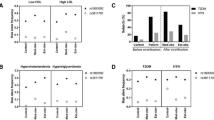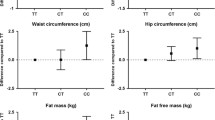Abstract
The importance of the genetic component on adipose tissue accumulation has been clearly demonstrated. Among the candidate genes investigated, there are those that regulate thermogenesis and, thus, can affect energy expenditure. The uncoupling proteins (UCPs) are a family of proteins that uncouple respiration leading to generation of heat and increased energy expenditure. Contradictory data indicate that allelic variants in their coding genes might be associated with obesity. In this study we evaluated the role of two allelic variants of the UCP2 gene in obesity and the association with its sub-phenotypic characteristics. To this aim, 360 morbidly obese patients [age: 45±15 yr, body mass index (BMI): 46±7 kg/m2] and 103 normal weight subjects (BMI <24 kg/m2) were genotyped for the 45 bais-pair (bp) insertion/deletion (I/D) in the 3′-un-traslated region of exon 8 of the UCP2 gene while the presence of an Ala/Val substitution at codon 55 (Ala55Val) of the same gene was studied in 104 obese and 50 lean subjects. Patients also underwent a study protocol including measurements of BMI, waist-to-hip ratio (WHR), resting energy expenditure (REE), energy intake, fat mass (FM) and free fat mass (FFM), total cholesterol (TCH), high density lipoprotein (HDL) cholesterol, triacylglyceroles (TG), leptin levels, basal glucose, im-munoreactive insulin (IRI), glycated haemoglobin (HbA1c), insulin sensitivity and thyroid hormones. No significant association between the two polymorphisms studied and the clinical, metabolic and anthropometric parameters characteristic of the obese phenotype was found. These results, in accordance with similar findings previously obtained in other ethnic groups, suggest that these two UCP2 allelic variants may not have a direct role in the pathogenesis and development of obesity.
Similar content being viewed by others
References
Borecki IB, Blangero J, Rice T, Perusse L, Bouchard C, Rao DC. Evidence for at least two major loci influencing human fatness. Am J Hum Genet 1998, 63: 831–8.
Montague CT, Sadaf Farooqi I, Whitehead JP, et al. Congenital leptin deficiency is associated with severe early onset obesity in humans. Nature 1997, 387: 903–8.
Strobel A, Issad T, Camoin L, Ozata M, Strosberg AD. A leptin missense mutation associated with hypogonadism and morbid obesity. Nat Genet 1998, 18: 213–5.
Clement K, Vaisse C, Laholou N, et al. A mutation in the human leptin receptor gene causes obesity and pituitary dysfunction. Nature 1998, 392: 398–401.
Wisse BE, Schwartz MW. Role of melacortins in control of obesity. Lancet 2001, 358: 857–9.
Jequier E. Does a thermogenic defect play a role in the pathogenesis of human obesity? Clin Physiol 2002, 3: 1–7.
Nicholls DG, Locke RM. Thermogenic mechanism in brown fat. Physiol Rev 1984, 64: 1–64.
Lean M, James WP, Jennings G, Trayhurn P. Brown adipose tissue uncoupling protein content in human infants, children and adults. Clin Sci (Oxf) 1986, 71: 291–7.
Millet L, Vidal H, Andreelli F, et al. Increased uncoupling 2 and 3 mRNA expression during fasting in obese and lean humans. J Clin Invest 1997, 100: 2665–70.
Weigle DS, Selfridge LE, Schwartz MW, et al. Elevated free fatty acids induce uncoupling protein 3 expression in muscle: a potential explanation for the effect of fasting. Diabetes 1998, 47: 289–302.
Carkin J, Mull E, Miao W, et al. Regulation of the thyroid member of the uncoupling protein family, UCP3, by cold and thyroid hormone. Biochem Biophys Res Commun 1997, 240: 222–7.
Gong DW, He Y, Karas M, Reitman M. Uncoupling protein 3 is a mediator of thermogenesis regulated by thyroid hormone beta 3-adrenergic agonist and leptin. J Biol Chem 1997, 272: 24129–32.
Pedersen O, Dalgaard LT. Uncoupling proteins: functional characteristics and role in the pathogenesis of obesity and Type II diabetes. Diabetologia 2001, 44: 946–65.
Urhammer SA, Dalgaard LT, Sorensen TIA, et al. Mutational analysis of the coding region of the uncoupling protein 2 gene in obese NIDDM patients: Impact of a common amino acid polymorphism on juvenile and maturity onset forms of obesity and insulin resistance. Diabetologia 1997, 40: 1227–30.
Otabe S, Clement K, Rich N, et al. Mutation Screening of the Human UCP 2 Gene in Normoglycemic and NIDDM Morbidly Obese Patients. Diabetes 1998, 47: 840–2.
Walder K, Norman RA, Hanson RL, et al. Association between uncoupling protein polymorphisms (UCP2-UCP3) and energy metabolism/obesity in Pima Indians. Hum Mol Genet 1998, 7: 1431–5.
Cassell PG, Neverova M, Jammohamed S, et al. An uncoupling protein 2 gene variant is associated with a raised body mass index but not Type II diabetes. Diabetologia 1999, 42: 688–92.
Wadden TA, Bartlet S, Letizia KA, Foster GD, Stunkard AJ. Relationship of dieting history to resting metabolic rate, body composition, eating behavior, and subsequent weight loss. Am J Clin Nutr 1992, 56: 203S–8S.
Katz A, Nambi SS, Mather K, et al. Quantitative insulin sensitivity check index: a simple accurate method for assessing insulin sensitivity in humans. J Clin Endocrinol Metab 2000, 85: 2402–10.
Kubota T, Mori H, Tamori Y. Molecular screening of uncoupling protein 2 gene in patients with noninsulin-dependent diabetes mellitus or obesity. J Clin Endocrinol Metab 1998, 83: 2800–4.
Klannemark M, Orho M, Groop L. No relationship between identified variants in the uncoupling protein 2 gene and energy expenditure. Eur J Endocrinol 1998, 139: 217–23.
Tu N, Chen H, Winnikes U, et al. Structural organization and mutational analysis of the human uncoupling protein-2 (hUCP2)gene. Life Sci 1999, 64: PL41–50.
Yanovski JA, Diament AL, Sovik KN, Nguyen TT, Li H, Sebring NG, Warden C. Associations between uncoupling protein 2, body composition, and resting energy expenditure in lean and obese African American, white, and Asian children. Am J Clin Nutr 2000, 71: 1405–12.
Astrup A, Toubro S, Dalgaard LT, et al. Impact of the V/V 55 polymorphism of the uncopling protein 2 gene on 24-h energy expediture and substrate oxidation. Int J Obes Relat Metab Disord 1999, 23: 1030–4.
Dalgaard LT, Sorensen TIA, Andersen T, Hansen T, Pedersen O. An untranslated insertion variant in the uncoupling protein 2 gene is not related to body mass index and changes in body weight during a 26-year follow-up in Danish Caucasian men. Diabetologia 1999, 42: 1413–6.
van Rossum CTM, Hoebee B, Seidell JC, et al. Genetic factors as predictors of weight gain in young adult Dutch men and women. Int J Obes Relat Metab Disord 2002, 26: 517–28.
Langin D. Diabetes, insulin secretion, and the pancreatic beta-cell mitochondrion. N Engl J Med 2001, 345: 1772–4.
Chan CB, De Leo D, Joseph JW, et al. Increased uncopling protein-2 levels in β-cells are associated with impaired glucose-stimulated insulin secretion. Diabetes 2001, 50: 1302–10.
Saleh MC, Wheeler MB, Chan CB. Uncoupling protein-2: evidence for its function as a metabolic regulator. Diabetologia 2002, 45: 174–87.
Esterbauer H, Schneitler C, Oberkofler H, et al. A common polymorphism in the promoter of UCP2 is associated with decreased risk of obesity in middle-aged humans. Nat Gen 2001, 28: 178–83.
Krempler F, Esterbauer H, Weitgasser R, et al. A functional polymorphism in the promoter of UCP2 enhances obesity risk but reduces type-2 diabetes risk in obese middle-aged humans. Diabetes 2002, 51: 3331–5.
Author information
Authors and Affiliations
Corresponding author
Rights and permissions
About this article
Cite this article
Maestrini, S., Podestà, F., Di Blasio, A.M. et al. Lack of association between UCP2 gene polymorphisms and obesity phenotype in Italian Caucasians. J Endocrinol Invest 26, 985–990 (2003). https://doi.org/10.1007/BF03348196
Accepted:
Published:
Issue Date:
DOI: https://doi.org/10.1007/BF03348196




